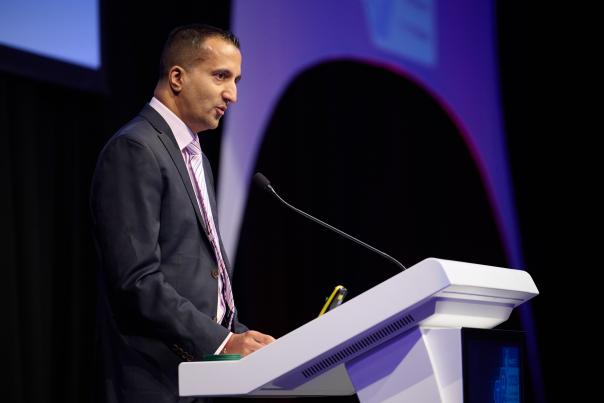
NACC chair Neel Radia began the forum on a high note, celebrating the 25th anniversary of the Care Chef competition and congratulating this year’s winner, Ilona Tomza.
He then turned to the crucial issues dominating the sector: chronic under-funding, the escalating cost of providing nutritional support, and a significant skills gap.
He highlighted a successful collaboration with the Hospital Caterers Association to reshape the Level 2 NVQ for healthcare catering, which had now been accepted by Ofqual. Further investment in professional development was announced with the new culinary leader training programme, developed in partnership with Umbrella Training, with details forthcoming.
Simon Stenning of Future Foodservice provided a session on ‘How Will Britain Eat in the Care Home Market Over the Next 10 Years?’. He stressed that operators must adapt to the changing demographics and expectations of future residents.
His vision of the future included amenities that are fundamental to modern life: on-site coffee shops and modern vending solutions to provide residents with choice and flexibility around the clock while also offering a practical staffing solution.
And there will be shifts in demand. While hot evening meals are currently popular, Stenning predicted the trend would move towards lighter options closer to bedtime, driven by an increased awareness of healthy eating and better ageing.
The future care home resident will also demand a wider choice of cuisines beyond traditional British fare, reflecting the changing tastes of younger generations. This includes an increase in non-white elderly, vegans, and meat reducers. Even the drinks menu is set for a shake-up, with 67% of people now expecting to drink alcohol in a care home, favouring cocktails over traditional sherry.
Innovation will also play a role, with concepts like 3D-printed food and jelly drops to increase fluid intake hinting at what’s to come. Caterers must also prepare for the impact of weight-loss medication, which will require offering smaller, mini-versions of popular treats and meals.
Central Kitchens and Recruitment Rethink
Two practical case studies offered compelling solutions to the challenges of quality, consistency, and recruitment.
Josh Hawker of AbleCare Homes, a Bristol-based, family-run group, presented a convincing argument for central production kitchens. Facing the reality that an average of 16 residents was insufficient to keep a dedicated chef busy in each home, AbleCare implemented a centralised cooking model. This allowed them to attract and retain a high-calibre team, like their sous chef Caitlin, who was a runner-up in this year’s Care Chef of the Year competition.
The shift has eliminated on-site catering staff, reducing kitchen space and allowing for new resident-friendly uses, like baking sessions. The increased capacity has also led to diversification, including a local office-block café, and a new ambition to sell to other care homes in the south west.
Addressing staff retention and recruitment, Andrew Stokes of Fife Council detailed its alternative approaches. These have included the return to using CVs in applications after a drop-off when only statements were accepted.
The council has also partnered with organisations like Fife Gingerbread (supporting single parents) and has worked to make job roles more appealing to younger applicants who value perks like flexible working and discounts over a pension scheme.
Key to their success has been a bespoke landing page on the council website that features 90-second ‘day in the life’ videos to promote roles, and a structured, compulsory, and paid induction programme to professionalise the onboarding of new staff.
Meanwhile, David Mulcahy, vice president of the Craft Guild of Chefs, emphasised future-proofing care home catering by creating a positive, nurturing environment that treats residents as though they were in their own homes. He stressed the importance of engaging teams in improving skills levels through training.
He advocated looking at the wider industry, leveraging supplier knowledge, and exploring opportunities like job-sharing and local community outreach. He also highlighted the role of smart equipment, such as low-energy, no-fat air fryers, which are becoming essential for modern, efficient care kitchens.
This push for efficiency and personalisation was further explored by Dr Jane Townson of the Homecare Association, who addressed the Use of AI and Technology in Care Services. She said it could help solve the challenges of recruitment, personalisation, and compliance by tailoring menus and purchases to individual residents.
Service robots are already in use in Asia and the US for serving and delivery, but she suggested UK care homes could start with serving robots to minimise hygiene risks and increase productivity.
The Resident’s Wellbeing: Beyond the Plate
A panel that looked at this issue heard Susan Price of the British Dietetic Association say that aside from a recommended Vitamin D supplement, all necessary nutrition should be provided through regular food. Charlotte Rudge of the Care Quality Commission (CQC) stressed the importance of a well-documented resident assessment, offering advice on meeting Regulation 14 (nutrition and hydration) and encouraging caterers to engage with inspectors and share their successes.
Jody Marshall of Meallmore shared an effective training method where the most junior staff member is put in charge as the mealtime ‘host’ and observed, ensuring consistency and promoting a positive dining experience.
The forum concluded with a critical panel on Eating & Drinking With Acknowledged Risk. The consensus, delivered by Dr Lindsey Collins (University of Bradford) and Alison Smith (NHS dietitian), was that positive risk-taking is part of being human, and residents should be encouraged to make informed choices.
Alex Ruck Keene, a barrister, said that if staff have explained the risks, minimised them, and have a procedure in place for a food-related incident, they have taken all necessary steps to act in the resident’s best interest.